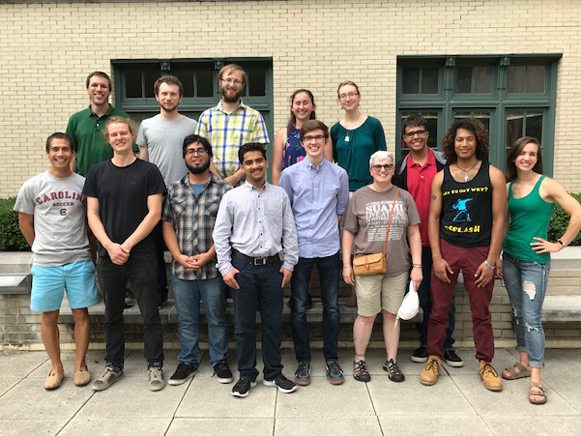Summer Undergraduate Applied Mathematics Institute
May 29 - July 24, 2018
Projects
► Mathematical measures of fairness in legislative districting, Brady Gales, Bryson Kagy
Advisor: David Offner
Abstract: Gerrymandering is the term used to describe the drawing of legislative districts to favor one party over another. Recently, many mathematicians have tried to develop mathematical tools to decide if legislative districts are gerrymandered, and define fair methods of districting. For example, Landau, Reid, and Yershov [A Fair Division Solution to the Problem of Redistricting, Social Choice and Welfare, 2008] propose a protocol for districting based on a two-player fair-division process, where each player is entitled to draw the districts for a portion of the state. We call this the LRY protocol.
Landau and Su [Fair Division and Redistricting, arXiv:1402.0862, 2014] propose a measure of the fairness of a districting called the geometric target. In this paper we prove that the number of districts a party can win under the LRY protocol can be at most two fewer than their geometric target, assuming no geometric constraints on the districts. This is the first quantitative bound of this type and we provide examples to prove this bound is tight. The main tools involved in the proof are identifying optimal strategies for each player in the protocol, and analyzing the number of districts they win using these strategies. We also show that the protocol on a state drawn with geometric constraints can produce an unbounded difference from the geometric target. Lastly, we explore ways to generalize the LRY protocol to more than two players, and define a similar protocol with lower bounds on number of victories.
► Probabilistic Analysis of a School Disciplinary Policy utilizing Markov Chains and Monte Carlo Simulations, Trajan Murphy
Advisor: Aris Winger
Abstract: We investigate school disciplinary policies which separate students into discrete categories based on their behavior and performance. We utilized Markov chains and Monte Carlo methods to give a probabilistic basis for the proportion of students in the red category in the long run for different types of schools.
► Minimal Risk Betting Analysis in Poker Tournaments, Uttam Bhetuwal, Angel Chavez, Isaac Dobes
Advisor: Aris Winger
Abstract: This paper focuses on minimal risk strategies for tournament style No-Limit Texas Hold'em. We write linear programs which provide a set of requirements for a conservative player to follow so that a favorable outcome is obtained.
We also model strategies by constructing stack functions, which map a strategy to it's expected outcome. We prove various properties of stack functions, which provide evidence in support of the conjecture that the minimal risk strategy corresponds to the line segment connecting (0; yo) to (n;A), where yo is the initial number of chips a player has in the tournament, and A is the desired amount of chips a player has at the end of the tournament.
► Rainbow numbers for $x_1 + x_2 = k x_3$ in $\mathbb{Z}_n$, Erin Bevilacqua, Samuel King, Suzannah Tebon
Advisor: Michael Young
Abstract: In this work, we investigate the fewest number of colors needed to guarantee a rainbow triple of the equation $x_1 + x_2 = k x_3$ for cyclic groups $\mathbb{Z}_n$. This value is called the Rainbow number and is denoted by $rb(\mathbb{Z}_n, k)$ for positive integer values of $n$ and $k$.
First we consider the Schur equation ($k=1$) and find that $rb(\mathbb{Z}_p, 1) = 4$ for all primes greater than 3 and that $rb(\mathbb{Z}_n, 1)$ can be calculated exactly from the prime factorization of $n$. For a general $k$ we find the exact value of $rb(\mathbb{Z}_p, k)$, for every prime $p$ and positive integer $k$. We also find that when $k$ is prime, $rb(\mathbb{Z}_n, k)$ can be calculated exactly from the prime factorization of $n$.
Students
- Erin Bevilacqua, Penn State University
- Uttam Bhetuwal, Troy University
- Angel Chavez, California State University, Los Angeles
- Isaac Dobes, University of Pittsburgh
- Brady Gales, Wake Forest University
- Bryson Kagy, Georgia Tech
- Samuel King, Rochester University
- Trajan Murphy, University of Connecticut
- Suzannah Tebon, Beloit College
Group photo

Faculty

David E. Offner, Associate Professor, Westminster College
Course: Combinatorial Optimization
Project Director
E-mail: offnerde@westminster.edu

Michael Young, Assistant Professor, Iowa State University
Project Director
E-mail: myoung@iastate.edu
